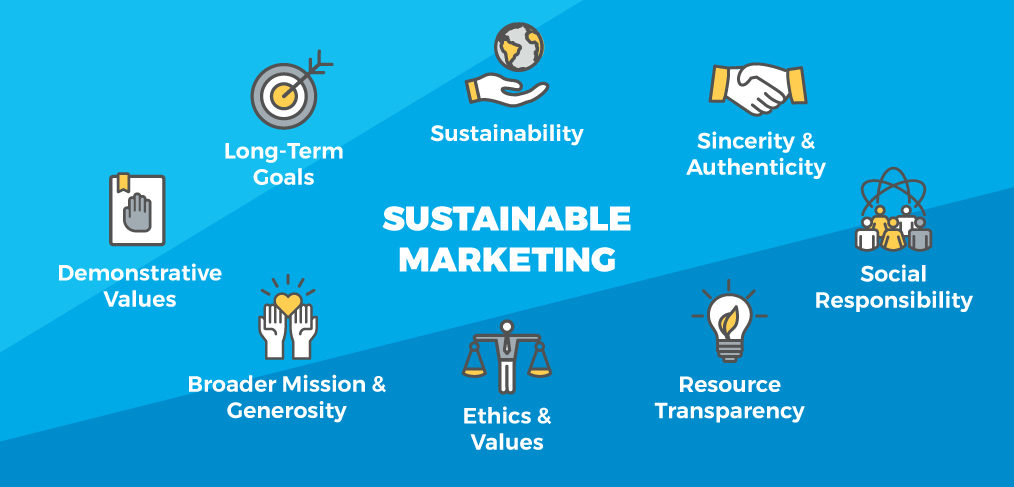In today's world, sustainability has become more than just a buzzword—it's a guiding principle that shapes consumer preferences, business strategies, and societal values. As businesses strive to align their practices with environmental and social responsibility, sustainable marketing practices have emerged as a powerful tool for driving growth, building brand loyalty, and making a positive impact on the planet. In this blog, we'll explore the importance of sustainable marketing practices and how businesses can integrate sustainability into their marketing strategies.
Sustainable Marketing Practices: A Paradigm Shift in Business
The concept of sustainable marketing practices encompasses a range of strategies aimed at reducing environmental impact, promoting social responsibility, and meeting the needs of present and future generations. From eco-friendly product design to ethical sourcing, sustainable marketing practices offer businesses the opportunity to differentiate themselves in the marketplace and build meaningful connections with environmentally and socially conscious consumers. By prioritizing sustainability in their marketing efforts, businesses can create value for both their bottom line and the planet.
The Case for Sustainable Marketing Practices
In today's hyper-connected world, consumers are increasingly aware of the environmental and social impact of their purchasing decisions. As a result, businesses that embrace sustainable marketing practices stand to gain a competitive advantage by meeting the growing demand for ethically produced and environmentally friendly products and services. By incorporating sustainability into their marketing messaging, businesses can attract a loyal customer base, enhance brand reputation, and drive long-term growth and profitability.
Integrating Sustainability into Marketing Strategies
Integrating sustainability into marketing strategies requires a holistic approach that encompasses product development, supply chain management, communication, and consumer engagement. Businesses can adopt sustainable practices at every stage of the marketing process, from sourcing raw materials responsibly to communicating transparently with customers about their sustainability efforts. By aligning marketing strategies with sustainability goals, businesses can create authentic connections with consumers and demonstrate their commitment to making a positive impact on the planet.
Transparency and Authenticity in Sustainable Marketing
Transparency and authenticity are essential pillars of sustainable marketing practices. Consumers today value honesty, integrity, and authenticity in the brands they choose to support. Businesses that are transparent about their sustainability initiatives and communicate honestly with customers are more likely to build trust and loyalty over time. By providing clear and accurate information about their sustainability efforts, businesses can empower consumers to make informed purchasing decisions and foster a sense of accountability for their environmental and social impact.
Educating and Engaging Consumers
Educating and engaging consumers is a key component of sustainable marketing practices. Businesses can use marketing channels to raise awareness about sustainability issues, communicate the benefits of eco-friendly products and practices, and inspire consumers to take action towards a more sustainable future. By providing educational content, hosting events, and encouraging consumer participation in sustainability initiatives, businesses can empower consumers to make positive choices that align with their values and contribute to a more sustainable world.
Measuring and Reporting on Impact
Measuring and reporting on the impact of sustainability initiatives is essential for accountability and continuous improvement. Businesses can use key performance indicators (KPIs) to track progress towards sustainability goals, such as carbon footprint reduction, waste reduction, and social impact metrics. By regularly monitoring and reporting on their sustainability performance, businesses can demonstrate transparency, accountability, and a commitment to continuous improvement to stakeholders, including customers, investors, and regulators.
Collaboration and Partnership for Collective Impact
Collaboration and partnership are essential for driving collective impact and scaling sustainable marketing practices across industries. Businesses can collaborate with suppliers, customers, industry peers, and non-profit organizations to address common sustainability challenges, share best practices, and drive innovation. By working together towards shared sustainability goals, businesses can leverage collective expertise and resources to create meaningful change and drive positive impact at scale.
Conclusion: Leading the Way with Sustainable Marketing Practices
In conclusion, sustainable marketing practices offer businesses a powerful opportunity to drive growth, build brand loyalty, and make a positive impact on the planet. By integrating sustainability into marketing strategies, businesses can differentiate themselves in the marketplace, attract environmentally and socially conscious consumers, and contribute to a more sustainable future. As consumers increasingly demand transparency, authenticity, and accountability from the brands they support, businesses that prioritize sustainability in their marketing efforts are well-positioned to lead the way towards a more sustainable and prosperous future for all.

No comments:
Post a Comment